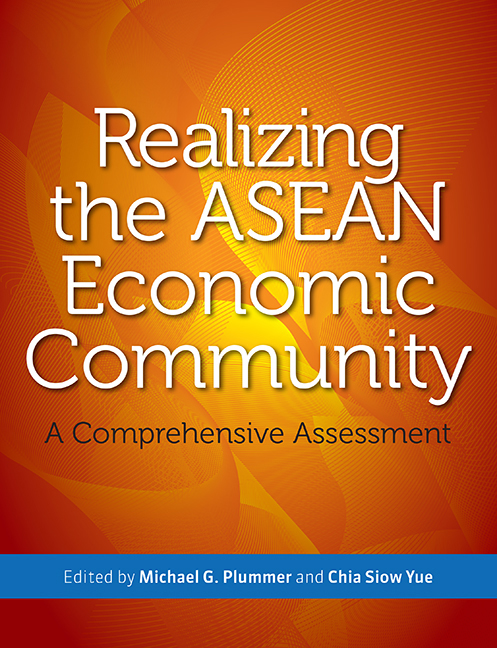Book contents
- Frontmatter
- Contents
- Illustrations
- Foreword
- Executive Summary
- Acknowledgements
- About the Contributors
- 1 Introduction
- 2 Regional Market for Goods, Services, and Skilled Labor
- 3 Competition Policy, Infrastructure, and Intellectual Property Rights
- 4 The AEC and Investment and Capital Flows
- 5 Narrowing the Development Gap in ASEAN
- 6 Competitiveness and Leverage
- 7 Benefits of the AEC
- References
- Appendix A AEC Components
- Appendix B The CGE Model
- Appendix C Developments in Logistics and Aviation
- Appendix D AEC Blueprint Excerpt
- Appendix E ASEAN Free Trade Agreements
- Appendix F ASEAN Member States' Free Trade Agreements
- Appendix G ASEAN Imports and Exports, 2000 and 2006
- Index
3 - Competition Policy, Infrastructure, and Intellectual Property Rights
Published online by Cambridge University Press: 21 October 2015
- Frontmatter
- Contents
- Illustrations
- Foreword
- Executive Summary
- Acknowledgements
- About the Contributors
- 1 Introduction
- 2 Regional Market for Goods, Services, and Skilled Labor
- 3 Competition Policy, Infrastructure, and Intellectual Property Rights
- 4 The AEC and Investment and Capital Flows
- 5 Narrowing the Development Gap in ASEAN
- 6 Competitiveness and Leverage
- 7 Benefits of the AEC
- References
- Appendix A AEC Components
- Appendix B The CGE Model
- Appendix C Developments in Logistics and Aviation
- Appendix D AEC Blueprint Excerpt
- Appendix E ASEAN Free Trade Agreements
- Appendix F ASEAN Member States' Free Trade Agreements
- Appendix G ASEAN Imports and Exports, 2000 and 2006
- Index
Summary
Under the AEC Blueprint, ASEAN is to embody a “competitive economic region” by 2015. Achieving this will require ASEAN Member States to adjust policies and practices related to competition, infrastructure development, intellectual property rights, and other related matters.
Currently, member states vary considerably in the sophistication of their competition policies, and some have only rudimentary or negligible policies in place. Strengthening competition policy in individual member states and harmonizing policies across the region could yield important economic benefits, in addition to ensuring an efficient and robust AEC. As we show in this chapter, empirical estimates of the potential benefits of a competitive economic region indicate that gains could be considerable, particularly for developing member states. GDP per capita for Indonesia, Malaysia, the Philippines, and Thailand could grow 3 percent and up to 15 percent more because of AEC-related competition policies, and by 2 percent to 12 percent more because of AEC-related infrastructure development. And FDI inflows to Indonesia, Malaysia, the Philippines, and Thailand as a percent of GDP could increase 10 to 14 percent. In sum, the gains from achieving a competitive economic region will likely far exceed those expected from, for example, liberalizing tariffs and nontariff barriers.
In this chapter, we evaluate the status of competition policy in ASEAN and the potential contributions of regional harmonization through the AEC; explore issues related to intellectual property protection; review infrastructure issues identified in the AEC Blueprint; and assess the state of consumer protection in the ASEAN region. We then present a quantitative assessment of the AEC competitive economic region using “extreme bound analysis” and the implications of that assessment for policy.
COMPETITION POLICY AND THE AEC
ASEAN aims to foster a culture of fair competition in Southeast Asia. Currently only Indonesia, Singapore, Thailand, and Vietnam have competition laws and regulatory bodies. ASEAN does not have either an official body for cooperative work on competition policy and law (CPL) or relevant bodies to exchange policy experiences and institutional norms pertinent to CPL.
- Type
- Chapter
- Information
- Realizing the ASEAN Economic CommunityA Comprehensive Assessment, pp. 58 - 82Publisher: ISEAS–Yusof Ishak InstitutePrint publication year: 2009



